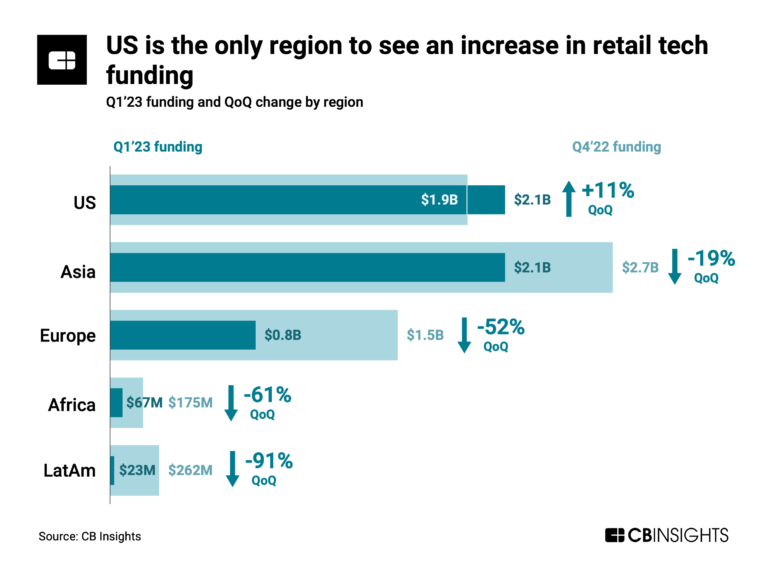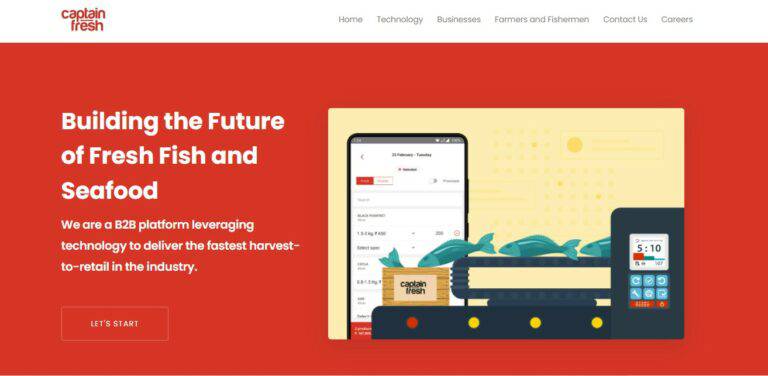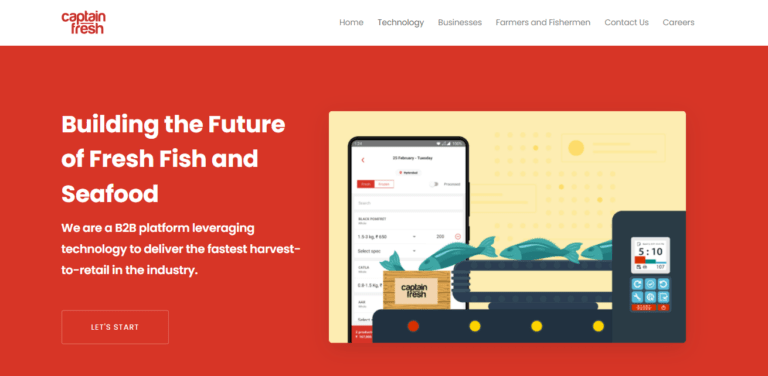
Freshtohome
Founded Year
2015Stage
Secondary Market | AliveTotal Raised
$272.2MLast Raised
$3.4M | 2 yrs agoMosaic Score The Mosaic Score is an algorithm that measures the overall financial health and market potential of private companies.
-43 points in the past 30 days
About Freshtohome
Freshtohome is a company focused on delivering fresh meat and seafood without the use of chemicals. They offer a variety of products including antibiotic-free chicken, fresh seafood, and halal-certified mutton. Their service caters to the convenience of home delivery, providing a range of ready-to-cook items, marinated meats, and meal combos. Freshtohome was formerly known as SeaToHome. It was founded in 2015 and is based in Bengaluru, India.
Loading...
Loading...
Research containing Freshtohome
Get data-driven expert analysis from the CB Insights Intelligence Unit.
CB Insights Intelligence Analysts have mentioned Freshtohome in 3 CB Insights research briefs, most recently on Apr 28, 2023.

Expert Collections containing Freshtohome
Expert Collections are analyst-curated lists that highlight the companies you need to know in the most important technology spaces.
Freshtohome is included in 3 Expert Collections, including Agriculture Technology (Agtech).
Agriculture Technology (Agtech)
2,160 items
Companies in the agtech space, such as equipment manufacturers, surveying drones, geospatial intelligence firms, and farm management platforms
Supply Chain & Logistics Tech
4,049 items
Companies offering technology-driven solutions that serve the supply chain & logistics space (e.g. shipping, inventory mgmt, last mile, trucking).
Food & Meal Delivery
1,531 items
Startups and tech companies offering online grocery, food, beverage, and meal delivery services.
Freshtohome Patents
Freshtohome has filed 2 patents.
The 3 most popular patent topics include:
- cloud storage
- information technology management
- process management

Application Date | Grant Date | Title | Related Topics | Status |
|---|---|---|---|---|
10/7/2019 | Cloud storage, Data warehousing, Process management, Information technology management, Supply chain management | Application |
Application Date | 10/7/2019 |
|---|---|
Grant Date | |
Title | |
Related Topics | Cloud storage, Data warehousing, Process management, Information technology management, Supply chain management |
Status | Application |
Latest Freshtohome News
Sep 4, 2024
Recent years have turned the tide on online meat startup fortunes, with many posting losses and some even shutting shop. For others, even offline expansion offers low margins and heavy capital expenditure. So what’s next on the menu for these retailers? Wednesday September 04, 2024 , 8 min Read Meat buying has traditionally been a very hands-on process. Meat eaters generally prefer to personally select the cut, inspect the freshness of the catch, and understand its procurement tactics. The pandemic brought in a new wave of online-first meat and seafood startups looking to make their mark on the sector, riding on the surge in funding into the Indian startup ecosystem between 2020 and 2022. Meat distributor Licious turned into a D2C unicorn in 2021, after raising $52 million in its Series G round. It has raised $490 million in funding so far and has a valuation of $1.47 billion as on September 21, 2023, according to Tracxn. Meanwhile, its peer, FreshToHome, also raised $104 million in funding led by Amazon Sambhav Venture Fund in 2023, taking its cumulative funding to $286 million. However, the meat startup sector’s fortunes has since taken a turn for the worse: consumer preferences have largely reverted back, and online meat and seafood retailers have either had to wind down their operations or continue with heavy losses with zero to little gains to show for it in the topline. Licious clocked a 9.6% growth in its operating income to Rs 747.7 crore during FY23 from Rs 682.5 crore in FY22. It posted a loss of Rs 500 crore during the same period, marginally up from Rs 485 crore a year ago. Meanwhile, FreshToHome recorded a revenue of Rs 110.3 crore, resulting in a loss of Rs 409.5 crore. FreshtoHome did not respond to YourStory’s request for comment. Expensive cold chain solutions, too much competition in a saturated market, unpredictable pricing, and ultimately, a lack of sufficiently appealing value additions to draw in a larger consumer base are just some of the challenges that dog online-first players, and are compelling them to look at alternative methods to bolster their bottomline. Muddy waters One of the biggest problems faced by online-first startups in the domestic seafood and meat market has been their inability to effectively disrupt the traditional supply chain to customers. While consumers may have moved towards online channels for the convenience of delivery, especially during a lockdown, they now seek physical touchpoints to verify product freshness and that the meat cuts are processed in clean and hygienic conditions. Mandrita, a Bengaluru-based Product Manager, says, she prefers shopping for her fish specifically from the nearby HAL market as opposed to ordering online. “There is a larger variety to pick from and you get the option of choosing from a variety of sizes. While I do have to clean the meat afterwards, I know it is freshly cut and sold, moreover it is easily 20% cheaper than online alternatives,” she adds. This consumer preference, combined with competition from FMCG brands like Godrej, Venky’s, and Nandus, makes climbing the profit peak a little too difficult for the meat startups . Neighborhood stores do not invest in high-tech tech stack and cold chain infrastructure solutions, allowing for lower operational costs, which in turn enable them to sell at a lower price—a liberty online meat brands cannot afford. Most players who try to reach their customers through Foodhalls and grocery marts just do it for the brand positioning, as these placements come with steep margins, explains Mark Alzawahra, MD and Founder of seafood wholesaler Catch Of Norway Seafood. Commission fees for Nature Baskets, Foodhalls, and the likes can go as high as 40% and in very rare cases it will go under 25% after hard negotiations, he adds. Since branded cuts on grocery store shelves are too expensive, online food startups have had to go back to industry roots and set up brick and mortar shops, which come with high capex requirements and fewer neighborhoods which can absorb expensive meat outlets. As a dire example of this, Chennai-based meat startup Fipola was forced to cease its operations in February 2023, when it failed to raise funds after its aggressive offline expansion. Also Read What’s the catch? To combat the crunch, meat players are shifting to alternatives to reach customers directly through brick and mortar outlets, including shifting customer bases to supply to businesses (B2B), or looking to export to other international markets. Typically, in the food industry, clients of a B2B business include restaurants, hotels, caterers, or other marketplaces that place orders. An increasing number of online meat startups are pivoting to this model to keep revenue up, as is the case for online seafood firm Captain Fresh , which sources directly from farms and fishermen and distributes to other retailers. “This industry doesn't need a B2C channel or a brand, because there is already a lot of real estate that the world has allocated for this product. If you walk into a retail chain across US or Europe, close to 30-35% of the overall floor space is allocated for meat, seafood,” says Utham Gowda, Founder, Captain Fresh. Early on, Captain Fresh realised that a B2B channel was the only scope for growth in this industry. It later shifted its focus entirely to a B2B model outside of India. Meanwhile, Gurugram-based ZappFresh sees a nearly 50-50 distribution in its B2B and direct-to-consumer (D2C) channels. It plans to clock a revenue of Rs 160 crore in FY24-FY25 with a significant jump in profit after tax, something its peers are yet to manage. "While offline may look very promising and lucrative, it is extremely complex to crack that as well. And running and owning a store may not be the right format to build a profitable business in this space," notes Deepanshu Manchanda , Co-founder and CEO of Zappfresh. “As a business, you would want to liquidate the stock in time, it is a challenge to hold the inventory for a long period especially when the product is perishable. A B2B channel allows us to liquidate unsold inventory and bring more equilibrium across the board,” he adds. Moreover, while seafood is a price-sensitive commodity, the industry, however, works on a mostly fixed-price basis. Therefore it is crucial for distributors to have a large enough base to mitigate any fluctuations in the distribution chain on the retail level. Fluctuating market prices is a concern, especially for premium seafood like salmon, where market prices update every week globally. “In India, domestic seafood prices are subject to daily or weekly fluctuations, largely influenced by seasonality, weather conditions, and availability of appropriate sizes to be caught and sold. Since hotels and restaurants update their menus quarterly or semi-annually, they prefer to enter into contracts to maintain price stability and stay competitive," Alzawahra says. A large base requires an even larger logistics channel. It is particularly difficult when the commodity is prone to spoilage if not stored properly and has a short shelf life. Industry executives believe that a fragmented cold chain is one of the biggest challenges that needs to be addressed, as it allows companies to establish equilibrium with fluctuations in pricing and food inflation. Also Read Long way from home With the domestic market fraught with so many challenges, seafood players are looking towards thicker wallets across the sea. Seafood is one of the biggest categories of export in the country. India exported 17,81,602 metric tonnes of seafood worth Rs 60,523.89 crore ($7.38 billion) during 2023-24; and exports improved 2.67% in quantity terms during the same period. The USA and China are the major importers of India's seafood, according to the Indian Ministry of Commerce & Industry. Online startups are vying to cash in on this significant revenue stream. The Indian market accounts for less than 10% of Captain Fresh’s total revenue. Its peer, FreshToHome, which picked up its latest bag of funds to expand its GCC and international operation, is also relying heavily on its global businesses. “The take rates, the margin profile that you have in the international markets is very different compared to what you have in the Indian market. And if you have access to supply, you are better off chasing markets where monetisations are higher compared to markets like India,” adds Captain Fresh's Gowda. Meanwhile, Zappfresh, which recently acquired Mumbai-based Bonsaro and Bengaluru native Dr. Meat to expand its operation across Western and Southern regions, respectively, is now looking to expand to the Middle East in a format similar to its domestic markets. Most of the biggest buyers globally in the meat sector are hotels and restaurants, and this provides the bulk of the volume for imported meat and seafood. “The feasibility of online models in global markets depends on several factors. For one, the ability to adapt to diverse regulatory requirements and establish a reliable cold chain infrastructure is crucial,” says Prateek Toshniwal, Partner–MICS International & Co-founder, IVY Growth, and an investor in Zappfresh. “Additionally, leveraging online platforms allows for efficient market entry with lower overhead compared to traditional retail setups,” he notes. Edited by Jyoti Narayan
Freshtohome Frequently Asked Questions (FAQ)
When was Freshtohome founded?
Freshtohome was founded in 2015.
Where is Freshtohome's headquarters?
Freshtohome's headquarters is located at Carlton Towers, Old Airport Road, Bengaluru.
What is Freshtohome's latest funding round?
Freshtohome's latest funding round is Secondary Market.
How much did Freshtohome raise?
Freshtohome raised a total of $272.2M.
Who are the investors of Freshtohome?
Investors of Freshtohome include The Allana Group, Tikehau Capital, Ascent Capital, Iron Pillar, Investment Corporation of Dubai and 24 more.
Who are Freshtohome's competitors?
Competitors of Freshtohome include Udaan, Jumbotail, Captain Fresh, Zappfresh, BigBasket and 7 more.
Loading...
Compare Freshtohome to Competitors
Licious is a consumer food company specializing in the delivery of fresh meat and seafood products. The company offers a range of natural and healthy meat products, including chicken, mutton, and seafood, which are handpicked and maintained at specific temperatures to ensure freshness from procurement to delivery. Licious primarily serves the direct to consumer market with a focus on quality, hygiene, and convenience. It was founded in 2015 and is based in Bengaluru, India.
Zappfresh operates as a fresh meat brand operating in the food industry. The company's main service is the procurement, processing, storage, and delivery of fresh meat products, ensuring the freshness and health content of the meat through a cool chain organization. It primarily serves the food and beverage industry. Zappfresh was founded in 2015 and is based in New Delhi, India.

BigBasket is an online supermarket focusing on grocery delivery services. The company offers a wide range of products including fresh produce, dairy, meat, household essentials, and branded food items, catering to the daily needs of customers. BigBasket serves a broad consumer base with services like scheduled slotted deliveries and an expedited delivery option called bbnow for immediate needs. It was founded in 2011 and is based in Bangalore, India. BigBasket operates as a subsidiary of Tata Group.
Satvacart is a company that provides online grocery shopping services with home delivery. It offers a range of supermarket products including fresh fruits, vegetables, dairy, bakery items, spices, staples, personal care, and home care supplies. Satvacart serves customers looking for options in their grocery shopping. It was founded in 2014 and is based in Gurgaon, India.

Zepto operates as an e-grocery company in the quick commerce sector. The company offers products, including daily essentials, fresh fruits and vegetables, dairy, health and hygiene products, and more, all delivered to customers' doors. It primarily serves the e-commerce industry, specifically in the grocery segment. Zepto was formerly known as KiranaKart. It was founded in 2021 and is based in Mumbai, India.
Jumbotail offers a B2B marketplace and a retail platform focusing on the food and grocery sector. The company connects mom and pop grocery retailers with brands and staples producers, offering a wide selection of products supply chains, and logistics. Jumbotail also provides fintech solutions including payment services access to working capital credit, as well as a cloud-based retail operating system for small grocery stores. It was founded in 2015 and is based in Bengaluru, India.
Loading...

